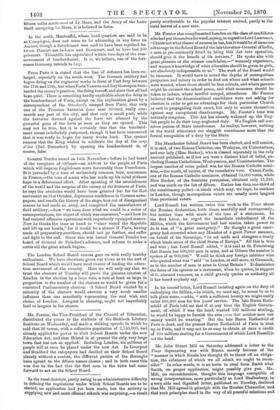Mr. Forster also complimented London on the class of candidates
who had put themselves forward, saying, in regard to Lord Lawrence, "I knownot what chance of success he has, but it would be of immense advantage to the School Board if the late Governor-General of India,. a man so pre-eminently fitted to bring this Act into operation,. should give it the benefit of his services." He spoke also with. great pleasure of the women candidates,—" womanly experience,. and women's knowledge of what education should be given to girls,. are absolutely indispensable to us." The work of the Board would, be immense. It would have to sound the depths of metropolitan. pauperism and misery in order to find out where and what schools. were wanted, where there should be free schools, and where parents, might be excused the school pence, and what measures should be taken to induce, where needful compel, attendance. Mr. Forster believed that the denominational candidates were not asking for' election in order to get an advantage for their particular Church or sect in propagating their creed, but only to secure themselves. against any exceptional disadvantage. Mr. Forster's tone was naturally sanguine. This Act has already wakened up the Eng- lish people to do their long-neglected duty. We English call our- selves jealous of State interference. In reality, however, nothing- in the world stimulates our sluggish consciences more than the- formal recognition of a duty by the State.


































 Previous page
Previous page